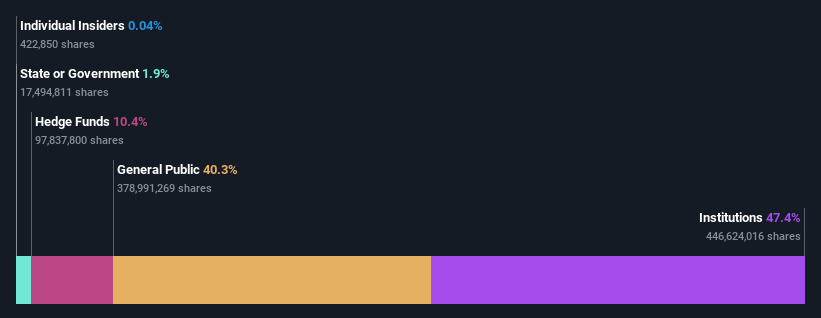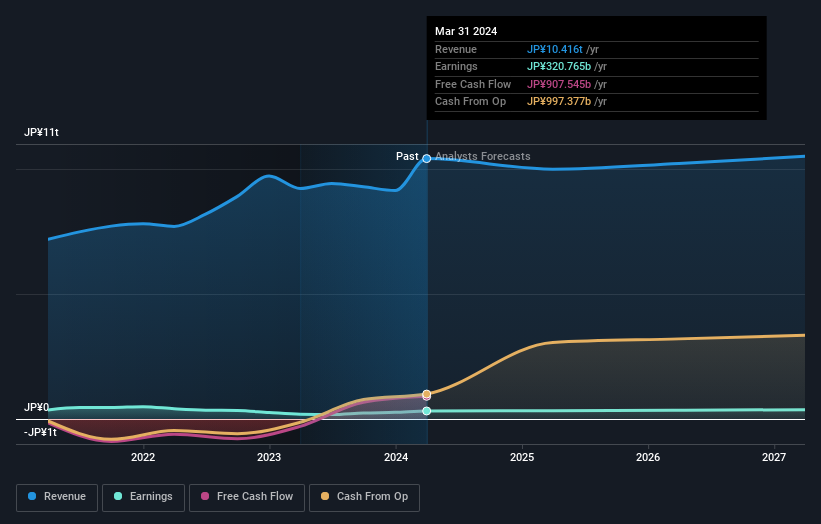Stock Analysis
Institutional investors are Dai-ichi Life Holdings, Inc.'s (TSE:8750) biggest bettors and were rewarded after last week's JP¥366b market cap gain

Key Insights
- Given the large stake in the stock by institutions, Dai-ichi Life Holdings' stock price might be vulnerable to their trading decisions
- 50% of the business is held by the top 16 shareholders
- Ownership research along with analyst forecasts data help provide a good understanding of opportunities in a stock
Every investor in Dai-ichi Life Holdings, Inc. (TSE:8750) should be aware of the most powerful shareholder groups. With 47% stake, institutions possess the maximum shares in the company. That is, the group stands to benefit the most if the stock rises (or lose the most if there is a downturn).
And last week, institutional investors ended up benefitting the most after the company hit JP¥4.3t in market cap. The one-year return on investment is currently 69% and last week's gain would have been more than welcomed.
Let's take a closer look to see what the different types of shareholders can tell us about Dai-ichi Life Holdings.
See our latest analysis for Dai-ichi Life Holdings

What Does The Institutional Ownership Tell Us About Dai-ichi Life Holdings?
Institutions typically measure themselves against a benchmark when reporting to their own investors, so they often become more enthusiastic about a stock once it's included in a major index. We would expect most companies to have some institutions on the register, especially if they are growing.
We can see that Dai-ichi Life Holdings does have institutional investors; and they hold a good portion of the company's stock. This suggests some credibility amongst professional investors. But we can't rely on that fact alone since institutions make bad investments sometimes, just like everyone does. If multiple institutions change their view on a stock at the same time, you could see the share price drop fast. It's therefore worth looking at Dai-ichi Life Holdings' earnings history below. Of course, the future is what really matters.

It looks like hedge funds own 10% of Dai-ichi Life Holdings shares. That catches my attention because hedge funds sometimes try to influence management, or bring about changes that will create near term value for shareholders. The company's largest shareholder is Effissimo Capital Management Pte Ltd., with ownership of 10%. For context, the second largest shareholder holds about 6.7% of the shares outstanding, followed by an ownership of 4.3% by the third-largest shareholder.
After doing some more digging, we found that the top 16 have the combined ownership of 50% in the company, suggesting that no single shareholder has significant control over the company.
While it makes sense to study institutional ownership data for a company, it also makes sense to study analyst sentiments to know which way the wind is blowing. There are a reasonable number of analysts covering the stock, so it might be useful to find out their aggregate view on the future.
Insider Ownership Of Dai-ichi Life Holdings
The definition of an insider can differ slightly between different countries, but members of the board of directors always count. Management ultimately answers to the board. However, it is not uncommon for managers to be executive board members, especially if they are a founder or the CEO.
Most consider insider ownership a positive because it can indicate the board is well aligned with other shareholders. However, on some occasions too much power is concentrated within this group.
Our most recent data indicates that insiders own less than 1% of Dai-ichi Life Holdings, Inc.. Being so large, we would not expect insiders to own a large proportion of the stock. Collectively, they own JP¥1.9b of stock. In this sort of situation, it can be more interesting to see if those insiders have been buying or selling.
General Public Ownership
The general public-- including retail investors -- own 40% stake in the company, and hence can't easily be ignored. This size of ownership, while considerable, may not be enough to change company policy if the decision is not in sync with other large shareholders.
Next Steps:
While it is well worth considering the different groups that own a company, there are other factors that are even more important. For example, we've discovered 1 warning sign for Dai-ichi Life Holdings that you should be aware of before investing here.
But ultimately it is the future, not the past, that will determine how well the owners of this business will do. Therefore we think it advisable to take a look at this free report showing whether analysts are predicting a brighter future.
NB: Figures in this article are calculated using data from the last twelve months, which refer to the 12-month period ending on the last date of the month the financial statement is dated. This may not be consistent with full year annual report figures.
Valuation is complex, but we're helping make it simple.
Find out whether Dai-ichi Life Holdings is potentially over or undervalued by checking out our comprehensive analysis, which includes fair value estimates, risks and warnings, dividends, insider transactions and financial health.
View the Free AnalysisHave feedback on this article? Concerned about the content? Get in touch with us directly. Alternatively, email editorial-team (at) simplywallst.com.
This article by Simply Wall St is general in nature. We provide commentary based on historical data and analyst forecasts only using an unbiased methodology and our articles are not intended to be financial advice. It does not constitute a recommendation to buy or sell any stock, and does not take account of your objectives, or your financial situation. We aim to bring you long-term focused analysis driven by fundamental data. Note that our analysis may not factor in the latest price-sensitive company announcements or qualitative material. Simply Wall St has no position in any stocks mentioned.
Valuation is complex, but we're helping make it simple.
Find out whether Dai-ichi Life Holdings is potentially over or undervalued by checking out our comprehensive analysis, which includes fair value estimates, risks and warnings, dividends, insider transactions and financial health.
View the Free AnalysisHave feedback on this article? Concerned about the content? Get in touch with us directly. Alternatively, email editorial-team@simplywallst.com
About TSE:8750
Dai-ichi Life Holdings
Through its subsidiaries, engages in the provision of insurance products in Japan, the United States, and internationally.
Excellent balance sheet established dividend payer.

